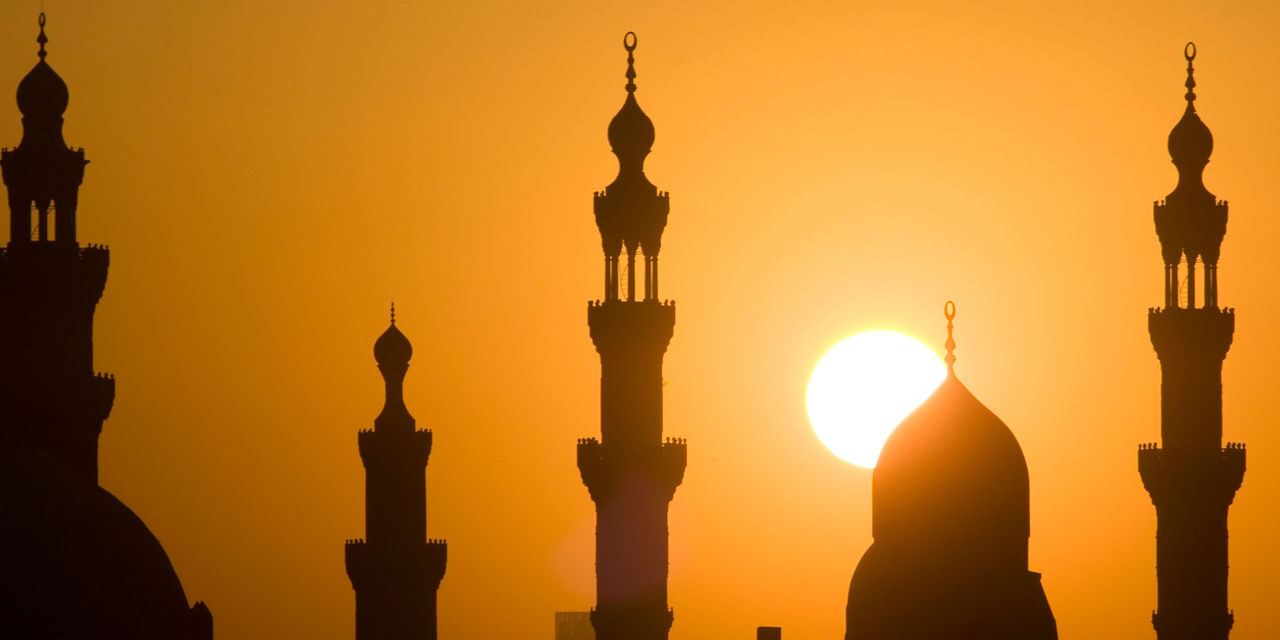A Simple, Logical and Innate Compliant Concept of God
Set of beliefs in God, which are logical, obvious and unequivocal. God, the Exalted and Glorified, is one; He has no partner nor similitude in His essence nor in His attributes. He never begets nor was He begotten. He is the ever living and the everlasting. He is separate from His creation, yet He is fully acquainted with their affairs. He is the All-Knowing, All-Able, Sustainer, Provider, Merciful, Compassionate Creator, where nothing can escape from being under His dominion.
Like He has perfected intricate laws for the universe to operate in, He has, similarly, perfected set of legislations to govern people’s affairs; regulate their relations with their Creator, themselves and the surrounding environment.
He sent messengers through time to convey His guidance to mankind. Amongst which and most important is to worship Him alone without associating any partners or mediators and to comply with His divine instructions. He made the reward for this compliance an eternal bliss in paradise, which He had described by saying “I’ve prepared for My righteous servants what no eye had seen, no ear had heard, and no heart can imagine” (Bukhari & Muslim)
He displayed enough evidences for His existence. This complex universe and every existing creature are explicitly convincing evidences. He said: (And in yourselves. Then will you not see? (i.e. the signs of the Creator) (Noble Qur’ān 51:21)
And, similarly, presented enough evidences that Islām is His final revelation to mankind, which is an extension for the message carried by His noble Prophets Adam, Noah, Abraham, Moses, David and Solomon up to Jesus peace be up on them all. And He utterly warned against rebelling against His unequivocal commandments.
An Everlasting Divine Guidance for Mankind
God revealed His final Book to mankind through His final messenger Muhammad peace be upon him (PBUH) and presented enough evidences that this Book is His final statement to mankind. A Book, which comprises man’s salvation and serenity in this life and the hereafter; a divine guidance, which holds instructions on how to govern our affairs, whether they were social, financial, political, judicial or penal; a Book which preserved human and animal rights and advocated global environment protection; a Book which is preserved verbatim from tampering with until today and maintained in the same language revealed to Prophet Muhammad PBUH, which is still spoken until today by the Arabs (i.e. Arabic language).
Read the Qur’ān for yourself to sense the beauty and comprehensiveness of His divine discourse to mankind and to see how Allāh had challenged mankind to come up with a similitude to the Qur’ān or to one chapter of it or to detect any flaw in it.
A Perfect Role Model to Follow
Allāh made Prophet Muhammad PBUH, who had attained human perfection in morals, a role-model for mankind to follow. He was a perfect example in mercy, humbleness, generosity, truthfulness, bravery …etc. Allāh verified his Prophethood in multitude of ways.
Muhammad PBUH called mankind to worship Allāh alone and display their servitude to their Lord. Man is constantly in dire need to satisfy his spiritual yearn and in perpetual quest for serenity, and the mean to all that is to connect with Allāh through the prescribed acts of worship that man performs on a daily bases to his Exalted Lord.
Man’s Worldly Behavior Entails Reckoning (The Day of Judgment)
Every created being will come to an end. Allāh, the Exalted, said: (What so ever is on it (i.e. Earth) will perish.) (The Noble Qur’ān 55:26).
Allāh, the Exalted, sent messengers through time to prepare us for that Day. A day where every human being since the beginning of creation will stand for reckoning and will be held accountable for everything he or she committed.
On that Day the Judge will be Allāh, the All-Wise and the one who is All-Just.
Allāh, the Exalted, said: (Surely! Allāh wrongs not even of the weight of an atom (or a small ant), but if there is any good (done), He doubles it, and gives from Him a great reward) (The Noble Qur’ān 4:40)
Those who believed in Allāh and complied with His instructions, which are conveyed by His messenger Muhammad PBUH, will enjoy an eternal bliss in paradise; while those who chose to disbelieve in God or associate partners with Him will be doomed eternally in hell fire.
Allāh, the Exalted, said: (And whoever opposes the Messenger after guidance has become clear to him and follows other than the way of the believers – We will give him what he has taken and drive him into Hell, and what an evil destination it is) (The Noble Qur’ān 4:115)
But as for Muslims, who fell short in complying with some of the obligatory instructions as long as it’s not violating their belief in the oneness of Allāh, it is up to Allāh whether to forgive or punish them on the Day of Judgment.
And always the doors of repentance are wide open for all mankind. Allāh accepts the sincere repentance and forgives what was before repenting. By becoming a Muslim you start a new clean record with Allāh.
Allāh, the Exalted, said: (Indeed, Allāh does not forgive association with Him (i.e. partners), but He forgives what is less than that for whom He wills. And he who associates partners with Allāh has certainly fabricated a tremendous sin.) (The Noble Qur’ān 4:48)
In brief, the Islāmic creed is based on these six articles (pillars) of faith:
1. To believe in Allāh
2. To believe in His Angels
3. To believe in His Books
(To believe that Allāh revealed Books to some Prophets and that Qur’ān is the final revelation to mankind, which abrogated all the previous Books.)
4. To believe in His Messengers
5. To believe in the Day of Judgment (Hereafter)
6. To believe in Predestination
(That everything that takes place is decreed by Allāh (i.e. known to Allāh and happened by His permission) and that He has given us free will)
The Pillars of Islām
Once a person accepts Islām by believing in the 6 articles of faith mentioned above, the next level is to comply with the following five pillars of Islām, which are required actions:
1. The Testimony of Faith
It is the statement said by a person to declare his acceptance of Islām and becoming a Muslim. The statement in English is:
“I bear witness that there is no deity worthy of worship but Allāh and I bear witness that Muhammad is His servant and messenger”.
2. Performing Prayer
To perform five daily prayers after making ablution.
3. Giving Obligatory Charity
If someone owned gold, silver or money for a whole year and reached a specific amount, he must give out 2.5 percent of that to the poor and needy.
Similarly, charity is given on livestock (only camels, cows and sheep) if it reached a specific number.
Also charity is given out on some of the harvested crops (stocked grains only) by giving 5-10% of it on harvest time.
4. Fasting the Month of Ramadaan
Fasting from dawn to sunset by abstaining from food, drinks and copulation.
5. Performing Pilgrimage to Makkah
Performed once in a life time for those who have the financial and physical capability.
Both the six articles (pillars) of faith and the five pillars of Islām must be believed in and accepted in order to be a Muslim. You may not believe in some and disbelieve in some to be a Muslim.
The Islāmic Legislation and Attaining its Objectives
Islām in its essence gave enormous attention to the five necessities and their preservation: Faith (Religion), life, intellect, progeny and property. The Islāmic precepts ((Aims of Islāmic legislation)) orbit around these five necessities, which are secured tightly with a robust fence of laws against any transgression while still meeting human demands.
- Hence, the pillars of Islām, enjoining the good and forbidding the evil were legislated to preserve Faith (Religion).
- Living in houses, eating, wearing garments, marriage and spending upon one’s family are means to preserve human life. This is why suicide, homicide and physical aggression deemed major sins.
- Similarly, intoxicants are forbidden to preserve the human mind (intellect) from decadence and failing to maintain its duties toward Allāh, itself or others. Instead, Islām encouraged the development of mind through the pursuit of knowledge.
- When you find stringent Islāmic laws pertaining fornication this is to protect the family, progeny and lineage and ensure the cohesion of society’s fabric. Thus, maintaining a specific dress code and modesty equally serve this purpose. The mean to preserve progeny and establish a relation between a male and a female is legitimate marriage.
- Also, theft, deception, usury, gambling, bribe and consuming others wealth unjustly were forbidden in order to secure people’s wealth (property). Instead, Islām encouraged working, investment and trade through legitimate means.
This is why penal laws were legislated to safeguard the five necessities against any aggression.
Finally, Islām is a comprehensive way of life, which caters the body and soul demands!
May Allāh open your heart to the truth and guide you to His True path.
Written by Mashoor As Suhaibi







I would like to thank you for the efforts you’ve put in penning this
site. I am hoping to view the same high-grade
content by you later on as well. In fact, your creative writing abilities
has encouraged me to get my own blog now 😉
Wonderful submit, very informative. I wonder why the other specialists of this sector don’t understand this. You should continue your writing. I am sure, you’ve a huge readers’
base already!
Hi friends, pleasant post and nice arguments commented at this place, I am in fact enjoying by these.
Oh my goodness! Awesome article dude!
Thanx!!
You really make it appear so easy along with your presentation but I in finding this topic to be really something which I think I would never understand. It sort of feels too complex and extremely huge for me. I am taking a look forward in your subsequent publish, I will attempt to get the hang of it!
My spouse and I stumbled over here from a different web address and thought I might check things out. I like what I see so now i’m following you.
This is nice.
Simply desire to say your article is surprising. The clearness on your put up is just excellent and I could think you are a professional on this subject. Fine with your permission let me to snatch your feed to stay up to date with approaching post.
Thanks one million and please carry on the enjoyable work.